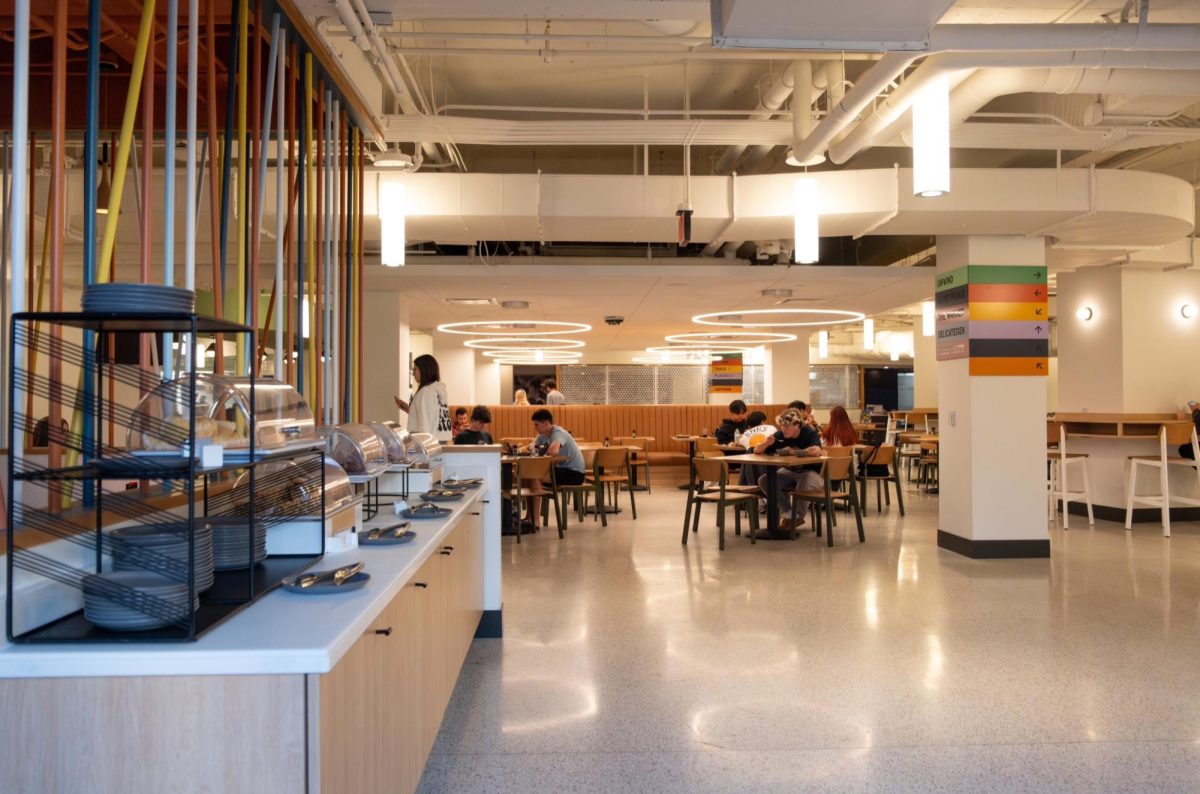After recent complaints of unsafe food at Pitt’s dining halls, including undercooked meat and bugs in produce, the Allegheny County Health Department has given the establishment a clean report.
Chartwells, the national food provider for Pitt’s dining services, also took measures to prevent unsafe food from being served again and implemented extra cautionary procedures, including conducting an ongoing investigation into the undercooked chicken and a new triple-wash policy for produce.
Pitt Eats, which is operated by Chartwells, invited health inspectors to the dining hall on Sept. 9. In a statement on Panther Central’s website, Pitt said “this location had no violations; no reinspection needed.”
“We’re deeply committed to serving safe food and have high expectations and standards for our partners,” Rose Basso, director of dining services at Pitt, said in a town hall meeting on Sept. 12. “We take [food safety] concerns very seriously. We are actively reviewing our partners’ processes and procedures and we are committed to holding them accountable for our standards.”
Maggie Weaver, senior marketing director for Chartwells at Pitt, affirmed the Eatery’s food safety standards but said new measures will be in place following the recent complaints.
“While all our culinarians are required to take food safety training and become ServSafe certified, on Sept. 2, we required all of our associates to retake their training,” Weaver said. “We are also working with our HR partners to educate those involved in any potential incidents.”
Representatives from Pitt Eats took responsibility for the instances of raw chicken but assured students that these were isolated incidents under investigation.
“We own the fact that there have been some photos not showing the program in the best of light recently,” Amanda Armstrong, vice president of marketing for Chartwells, said. “We have a
rigorous chicken safety protocol which involves temping and checking each piece of the entire batch to 165°. We currently have this incident under investigation and … our human resources team is currently involved because when these incidents occur, accountability needs to be held.”
Armstrong also addressed the concerns over bugs known as “loopers” found in a batch of broccoli. She credited the quick response to a student alerting staff to the issue.
“We were able to quickly pull the entire product and alert the vendor that we had received this product,” Armstrong said. “[Weather patterns] this time of year can affect a crop, and we have been informed that there is a higher chance of these small harmless cabbage loopers that like to hide deep within the stems of the broccoli.”
Weaver said dining staff will take extra precautions to deal with the loopers.
“Effective Sept. 16, we implemented a mandated triple-wash policy on all produce,” Weaver said.
Jaeda Lawton, a sophomore bioengineering major, said she found a larva in her kale at the Perch and posted photos of it to the Pitt 2027 public Snapchat story. She met with representatives from Pitt Eats after submitting a feedback form to Panther Central, who told her that the larva comes from the “harmless” Cabbage Moth.
“[Panther Central told me] these moth larvae feed off of common Brassicaceae crops (such as cabbage, broccoli, spinach, etc.) and grow on the underside of their leaves,” Lawton said. “Once they start growing from larvae to pupa form, these bugs tend to strongly latch onto the leaves, making them difficult to remove. Because of these pests, Pitt double washes their fresh produce to make sure everything is removed, but sometimes they don’t always catch everything.”
Basso gave assurance that the Eatery and other Pitt dining locations are being held accountable.
“We conduct weekly internal audits of the Eatery and monthly audits of our 30-plus dining locations on campus,” Basso said. “Additionally, we have a third-party contractor that conducts health inspections twice a year, and the Allegheny County Health Department performs unannounced inspections throughout the year.”
Despite these policies, some students say they are still hesitant to return to the Eatery after encountering unsafe food.
“It’s concerning for our health and everything,” Tanvi Bahal, a first-year chemistry major, said. “I haven’t eaten in the Eatery since.”
Bahal said when she saw the posts on social media, she inspected her Eatery meal more carefully than usual.
“I was looking at my pizza and I saw a white hair in the back of the pizza that was mixed in the dough. It was popping out,” Bahal said.
Lawton said she is still nervous to eat at both the Eatery or the Perch after her experience with the larvae.
“I tend to avoid the Eatery since it has patterns of making me feel ill, but I still feel mostly safe eating at the Perch,” Lawton said. “I do notice, however, I get a little nervous and I tend to inspect my food a bit more when I eat there. Since last week, I generally have made more of an effort to utilize the markets and my meal swaps at Pitt rather than eat at either dining hall.”
These concerns come after a foodborne norovirus spread through campus dormitories last spring.
Weaver urged any student who is served unsanitary food to report it promptly to dining staff.
“If a student believes they have been served unsafe food, or believe something they ate made them sick, we ask that they report it to one of our team members immediately,” Weaver said. “From these reports, our team can then immediately pull batches from the service line for investigation, look at temperature logs, vendor information and more, to determine the next best course of action.”


